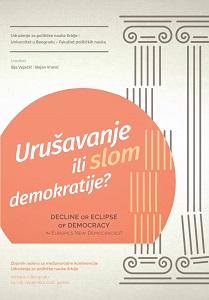Direct democracy and european union foreign policy: Lessons from California
Direct democracy and european union foreign policy: Lessons from California
Author(s): Roozbeh (Rudy) B. Baker
Subject(s): Government/Political systems, International relations/trade, Political economy, EU-Accession / EU-DEvelopment
Published by: Fakultet političkih nauka Univerziteta u Beogradu
Keywords: European Union; foreign policy; Enlargement Policy; California; direct democracy
Summary/Abstract: Beginning from humble roots linking portions of the manufacturing industries and wider economies of France, Germany (the Federal Republic), Italy, Belgium, Luxemburg, and the Netherlands, the European Union (EU) has grown to become one of the more unique and important supra-national institutions in the world. It is only within the past twenty years however that the EU has only begun to focus attention on developing its own independent foreign policy. Although one of the key pillars of the EU’s emerging foreign policy capacity has been its Enlargement Policy, the past few years have seen the limitations of this approach. This failure points to a need for a fundamental rethink of the EU’s strategic vision towards the countries on its periphery and a reorganization of the ways in which it targets its considerable “soft power”. In place of a focus on varied and widely ambitious political, social, and economic targets that seek to “build up” capacity for democratic reform and the rule of law, the EU should instead refocus its Enlargement Policy along more simple lines that seek to set up alternative centers of democratic engagement. Corrupt and compromised local
elites and the institutions they inhabit need to by-passed altogether. History can perhaps point the way forward for the EU. The American state of California in the early 1900s was a corrupt polity wholly owned and operated by the Central Pacific Railroad which bought and sold local politicians of all major ideological and party stripes. The hold of the Central Pacific over California state politics was only broken when crusading campaigners succeeded in passing a sweeping set of amendments to the state’s Constitution to completely destroy the influence of the Central Pacific over the state’s politics. The lessons from California, though almost a century old, still have resonance today and point to important lessons for the EU in its emerging foreign policy capacity.
Book: Urušavanje ili slom demokratije
- Page Range: 107-126
- Page Count: 20
- Publication Year: 2016
- Language: English
- Content File-PDF

